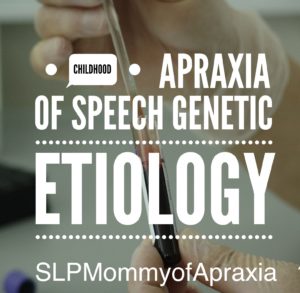The exploding genetic findings in Childhood Apraxia of Speech
Evidence is increasingly suggesting that genetics should be pursued as a cause in CAS.
An article recently came out in the Journal of Paediatrics and Child Health from Australia about new genetic recommendations for pediatricians. Australia is more on top of research because unlike the United States, research is actually funded there rather than having to be raised by non-profits and other donors to actually move forward.
In it, the authors discuss the exploding findings related to genetic research and Childhood Apraxia of Speech.
This current interest was catapulted by the discovery that a mutation on a gene called FoxP2 was implicated in both heritable and de novo causes of CAS up to almost 100% prevalence in affected individuals. Since that time, more genetic testing has been increasingly pursued and recommended in children who have CAS plus additional neurodevelopmental disorders.
16p.11.2 – Associated with CAS, moderate cognitive disability, autism, epilepsy, language disorder, and dysarthria.
The authors go on to discuss many other genetic disorders currently being implicated in CAS among other neurodevelopmental co-morbidities such as:
GRIN2A – CAS, dysarthria, and oral-motor impairments
SETBP1 – CAS, expressive language disorder but in tact receptive language disorder, decreased fine motor skills, ADHD, and autistic traits.
KANSL1 – Feeding difficulties, CAS, dysarthria and hyptonia
ELKS/ERC1 – CAS, delayed walking, language and reading difficulties, intellectual impairments, psychiatric manifestations, and ADHD. ASD was dx in some but had a low prevalency.
BCL11A – Associated with CAS, dysarthria, hypotonia, and general oral and gross motor dyspraxia.
These lists are not exhaustive and profiles of each disorder are not complete since the field of genetics is so new and reported cases are relatively small and based off of individual case studies.
The authors conclude that in cases of confirmed CAS (with the confirmed word being important since there is quite a bit of misdiagnosis) a referral to genetics should be considered since increasing evidence is showing the at CAS is a genetic disorder.
Another study in 2013 by Worthey et.al, concluded that whole exome sequencing (WES) supports genetic heterogenity in Childhood Apraxia of Speech. To clarify, since genetics was VERY confusing to me as a parent going through it, whole exome sequencing is different from a microarray and different from the standard genetic testing a pediatrician can order when screening for Syndromes such as Down Syndrome or Fragile X.
A lot of parents will say, well I had genetic testing and all results were negative. The question though really needs to be what kind of genetic testing did they have? Whole exome or partial exome testing is typically ordered through a genetics department that not only has a doctor specializing in genetics but is paired with a genetics counselor.
We are going to see a lot more genetic links in the future, but it’s important that parents and professionals know what genetic testing for which to ask.
Laura Smith is a mother to two beautiful children, one of which was diagnosed with apraxia and dyspraxia. She is a Denver based Speech/Language Pathologist now specializing in Childhood Apraxia of Speech. To learn more visit SLPMommyofApraxia.com
